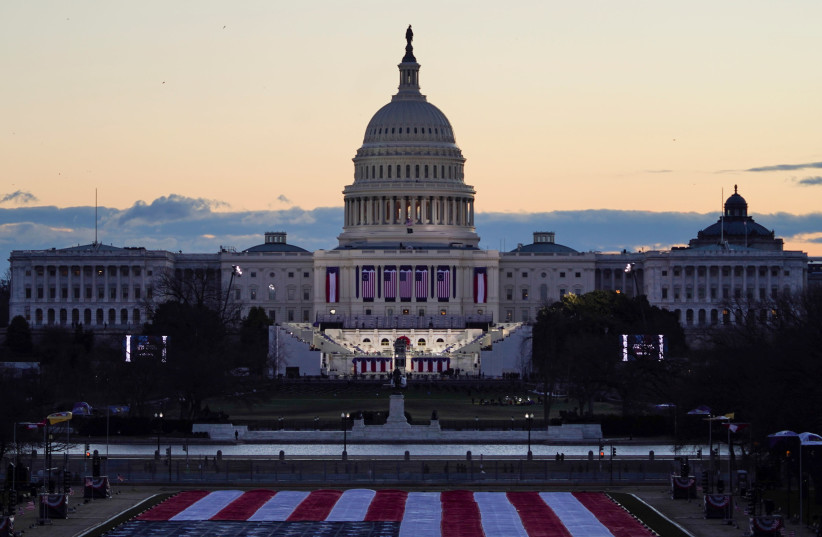The US will hold its midterm elections on Tuesday, with all 435 seats in the House of Representatives up for grabs, as are 35 Senate seats and 36 governorships.
Republicans would need to pick up five seats to take a majority in the House and just one to control the Senate.
A massive wave of Republican support could lead to declarations of victory hours after the polls close.
But with dozens of races expected to be close, and key states such as Pennsylvania already warning it could take days to count every ballot, experts say there is a good chance America goes to bed on election night without knowing who won.
President Biden will hope that Democrats can keep both chambers of Congress, allowing him to promote his legislative agenda, including codifying Roe. Vs. Wade into law. However, recent polling as well as historical data suggest that Republicans are poised to win the House of Representatives, with a good chance to win the Senate as well.

The high inflation, rising interest rates and slowing economy, together with a spike in crime in major US cities are all factors that could drive Republican turnout. Biden’s latest approval ratings were at 40%, a relatively low number, after 652 days in office, historically. On the other hand, issues such as abortion rights and US Democratic values could drive Democratic turnout, which could result in a high voting rate on both sides.
“Americans love change, and they almost always vote against the party in power,” said Logan Phillips, editor in chief at RacetotheWH, an interactive forecasts website that provides polling and predictions for every major Senate and governor’s race up in 2022.
Recent polls indicate that Republicans gained momentum recently, and they are likely to win the House and win the overall popular vote, Phillips said.
“Although now it’s close enough that I wouldn’t be shocked if Democrats won it,” he said. “But history suggests it’s the most likely result. Republicans are clear favorites. But given how motivated some Democrats are focusing on the midterms, I wouldn’t rule it out.”
Would the spike in antisemitism sway Jewish voters one way or the other?
For Jewish voters, the elections are coming amid a major spike in antisemitic incidents across the US. Given the tight polls in several states, including Pennsylvania, Nevada, Arizona and Georgia, the Jewish vote – known for its high turnout – could be an important factor in these races.
Jewish groups, such as the Jewish Democratic Council of America (JDCA) and the Republican Jewish Coalition (RJC), are also spending heavily in this cycle, including on TV ads in key battleground states, get-out-the-vote efforts, phone-banking and door-knocking.
JDCA CEO Halie Soifer said her group has done more in this election “than any in our four-year history, representing a historic effort to turn out Jewish voters in support of Democrats.”
“JDCA PAC has spent nearly $1 million on advertising in 11 states, with a significant increase in the final week for the key states of Arizona, Georgia, Nevada and Pennsylvania,” she said. “JDCA PAC’s digital ads, supporting 42 Democratic candidates, have been seen more than 42 million times. We are also engaging Jewish voters across the country in 16 states, where we’ve made more than 1.4 million direct voter contacts – more than double the number from 2020 – and the number will continue to grow between now and when the polls close on Election Day.”
RJC national political director Sam Markstein, said early on, the RJC invested heavily “to build out the most sophisticated, cutting-edge data operation in Jewish politics.”
“The RJC Victory Team and volunteers from across the country have spent months relentlessly executing a targeted, data-driven campaign to identify, persuade and turn out Jewish voters in support of GOP candidates in key battleground states like Pennsylvania, Georgia, Nevada and Florida,” he said.
“Importantly, in these last critical hours before the polls close on November 8th, we can effectively track which Jewish voters in our targeted outreach campaign have not yet voted and hyper-focus our grassroots efforts specifically to ensure they do vote on Election Day,” Markstein said. “We know that in close races, the Jewish vote could very well make the decisive difference. The stakes in this election couldn’t be higher, as Americans are fed up with the disastrous Biden-Schumer-Pelosi agenda, and the RJC will be working tirelessly until the polls close on Tuesday night to help secure Republican victories.”
The first wave of vote tallies are expected on the East Coast between 7 p.m. and 8 p.m. on Wednesday. An early indication of Republican success could come if the races that are expected to be close – such as Virginia’s 7th congressional district or a US Senate seat in North Carolina – turn out to be Democratic outs.
By around 10 p.m. or 11 p.m. ET, when polls in the Midwest will be closed for an hour or more, it is possible Republicans will have enough momentum for experts at US media organizations to project control of the House, said Kyle Kondik, a political analyst at the University of Virginia’s Center for Politics.
If the fight for the House still looks close as vote tallies start coming in from the West Coast – where there could be more than a dozen tight House races – it could be days before control of the chamber is known, some experts said.
California typically takes weeks to count all its ballots, in part because it counts ballots postmarked by Election Day even if they arrive days afterward. Nevada and Washington State also allow late ballots if postmarked by November 8, slowing down the march to final results.
If Georgia’s Senate race is as close as expected, and no candidate receives more than 50% of the vote, a run-off election would be scheduled for December 6, possibly leaving control of the chamber in limbo until then.
